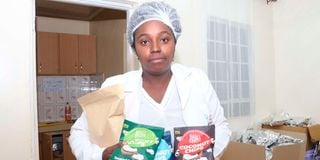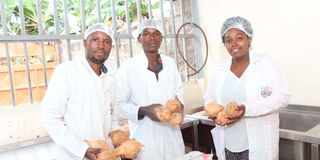Premium
Covid-19 Pandemic drove ICT graduate into ‘unknown’ world of coconut chips

Judy Mugure from Kinoo in Kiambu displays coconut chips which she makes from raw coconut.
Some 16 kilometres from Nairobi, along Waiyaki Way, is Kinoo township.
Kinoo is a popular residential and commercial hub, hosting hundreds of businesses and middle and high-income families.
Not far from the centre of Kinoo, on Muhuri Road, is Bakuli Foods – an establishment run by Ms Judy Mugure.
Ms Mugure, the founder of the business, is busy labelling a pack when the Seeds of Gold team arrives.
The 33-year-old makes value-added coconut products for the Kenyan market. They include garlic salt coconut, salted coconut, lightly salted coconut, chilly coconut and plain coconut chips.
“People only know of coconut cream, oil and milk but we also make chips,” she says.
Ms Mugure, a holder of an ICT degree from Kenya Methodist University, was a consultant before the value addition bug bit her. She graduated in 2012.
“I began by making reusable coconut and bamboo bowls in 2018 after investing Sh20,000 from my savings. I used to sell them in Kinoo and Nairobi,” she says.
Procedure
The bowls were made from coconut shells by scrapping out the flesh and then hollowing them.
The reusable bamboo straws were made out of organic bamboo branches. She first identified the right size of the bamboo before making a hole at the centre. Ms Mugure then sanded the straws at the ends before smoothening them from the outside to make them appealing.
Like today, Ms Mugure got most of her coconuts from Kilifi and Mombasa
For a bowl, she needed a mature well-rounded coconut and flat at the base. The key tools were a small handsaw for opening the coconut, sandpaper to smoothen the outside and a simple brush.
Ms Mugure bought a coconut for Sh40. Depending on size, a coconut bowl sold for Sh100 to Sh350 while a bamboo straw went for Sh80.
She also shreds the coconut innards and sold to restaurants.
Unfortunately, she was left with about 50 kilos of “coconut meat” that had no market when the coronavirus hit Kenya in early 2020. Ms Mugure stopped making the coconut bowls a mid-that year.

Judy Mugure (right) with her staff at her company's premises in Kinoo.
A visit to the Kenya Industrial Research and Development Institute (Kirdi) to learn the concepts of product development and how waste can be commercialised removed scales from her eyes.
“At the food department, I was taught about safety, slicing and drying. Kirdi linked me to an agency called Business Incubators for African Women Entrepreneurs, which helped me develop the products and get a Kenya Bureau of Standards certificate,” she says.
She moved to her current location in 2021 after securing a Sh400,000 loan from Lisha Fund. Ms Mugure used the money for rent, acquiring the county government licence and the Agriculture and Food Authority and Food Safety System Certification.
She also bought a locally assembled slicer, packaging vacuum, nitrogen machine and other gadgets.
She still sources coconuts from Mombasa and Kilifi, processing about 600 kilos daily. Her six contracted farmers also buy coconuts from others and transport them to Nairobi.
Substantial amounts
To make a tonne of chips, one needs 600-700 coconuts, says Judy.
“For the chilly coconut chips, for instance, we inspect, sort, grade and wash the coconuts. They are then dehusked, washed, sliced and dried. Later, the chilly flavour is added before packaging,” says the entrepreneur who has four employees.
The chilly coconut chips come in 40 and 100-gram packets. The former goes for Sh120 and the other for Sh200.
The chips can be eaten as a snack, put in porridge or used as salad.
Coconuts need to be handled properly once harvested. According to Ms Mugure, coconuts should come at reasonable prices, especially when one buys in bulk. That guarantees a profit.
The processing of the coconuts depends on orders placed by Ms Mugure’s customers.
The 1.2 tonnes for export is accumulated in a month, considering that her capacity for processing is limited due to space.
For export purposes, there is a white label for chilly coconut chip buyers.
Like any other business, Bakuli Foods experiences challenges.
Most coconut farmers at the Coast still use the old seed varieties that take five to six years to mature. Coconuts should be grown in fertile soil that is free from pests and diseases. Organic fertiliser is highly recommended.
Sustaining the market with different products made from coconut chips is not easy. One needs a substantial amount of cash for such a venture.
Apart from shops in Eastleigh, Ms Mugure sells her products through Jumia, Zucchini, Healthy You and Fresh to Go. She is also in talks with several supermarket chains.
Initially, Bakuli Foods had three directors but one left. Brand marketing manager Antony Magayu is a director and co-founder. He says coconut farming is sustainable as many products can be made from the plant.
“The farming goes beyond the fleshy insides of the coconut. Investment in extraction know-how is key,” Mr Magayu says.
Job creation
“The coconut supply chain creates many jobs. Young people and farmers can make good money, bearing in mind that there is always a stable market due to the diversification of coconut-related products.”
Ms Mugure advises that before one gets into any venture, one should think of unique products and services.
The potential entrepreneur should carry out market research to identify consumer needs.
Prof Richard Mulwa from the Department of Crop, Horticulture and Soils at Egerton University says the dry coconut meat is rich in manganese, selenium, copper, phosphorus and insoluble fibre.
“Coconut has anti-ageing properties too,” he says.





